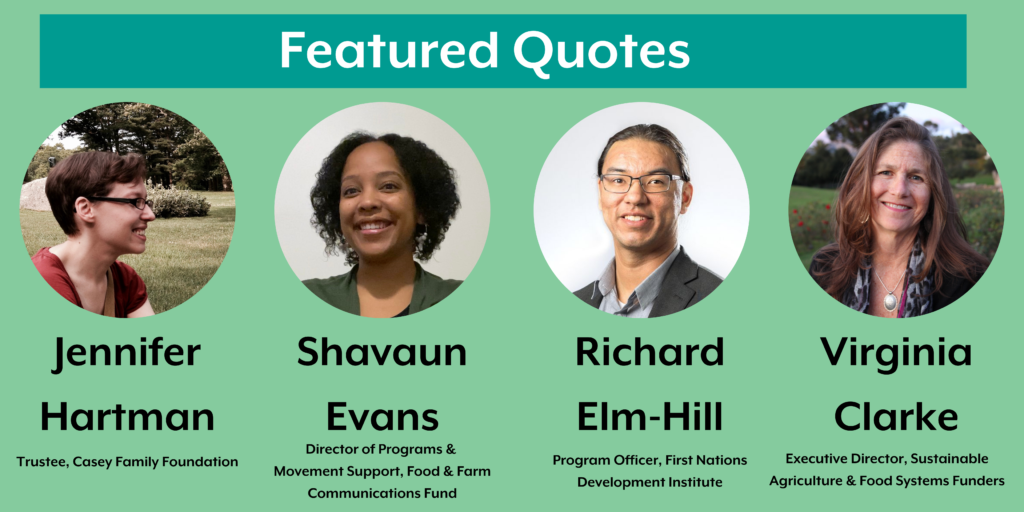For nearly 15 years, SAFSF has been hosting conversations to highlight the painful reality that Native communities receive only about 0.0025% of all philanthropic giving – and only a small portion of those grant dollars go to Native-led organizations. Philanthropic funding for Native communities, on whose stolen lands our agricultural industry and nation are built upon, lags behind funding to all other communities of color. Yet, in the wake of the health and economic devastation of COVID-19 on Native communities, the need for philanthropic commitment to Indian Country has never been greater.
Recognizing the need for deeper focus and intentionality from funders, Sustainable Agriculture and Food Systems Funders (SAFSF) and First Nations Development Institute (FNDI) developed the year-long Indigenous Food Systems Community of Practice that launched in July 2021. Our goal was to create a learning cohort for 15 food and agriculture funders who bring a commitment to investing in Indigenous communities and who have a range of experience with grantmaking (or investing) in sustainable agriculture and food systems work in Native communities. The Indigenous Food Systems Community of Practice is a space for these funders to learn and build direct relationships with Native practitioners and organizations; to share and hone their strategies for investing in Indigenous partners; to engage with and to rise above the barriers that Native communities face in securing funding; and to partake in the fellowship of other funders committed to investing in Indigenous communities.
“We’re a small-staffed foundation, and so appreciate ways to get educated and move into right relationship with the communities we want to work with, without having to burden current or future partners with that responsibility,” said participant Jennifer Hartman, a trustee with The Casey and Family Foundation. The foundation is looking to gather “knowledge to help us move forward with our grantmaking in ways that will help and not harm. Peer and affiliation groups and educational opportunities such as this have been invaluable to us.”
The Indigenous Food Systems Community of Practice is comprised of ten online sessions–complete with virtual site visits, group research projects, flash talks, and more – divided into two semesters. Guided and facilitated by Melvin Consulting PLLC, a Hopi-owned and led firm, participants have spent the first semester exploring the beauty, richness and complexity of Indigenous cultures, agriculture, and food, in both historical and present-day contexts through conversations with a variety of Native speakers. They have also learned about long-standing stewardship and conservation practices in Indigenous communities and dug into the obstacles faced in securing funding for these projects.
“I come from an organizing background and joined philanthropy with the hopes of shifting traditional philanthropic practices so that communities on the ground are more adequately supported and resourced for the long-term,” said participant Shavaun Evans, Director of Programs and Movement Support with the Food and Farm Communications Fund. “I believe that participation in this cohort will support my learning journey towards those goals and help me build a foundation of understanding of Indigenous food and farming communities and philanthropy’s historical investment – and lack of investment – in Indigenous-led work.”
When sessions resume in January 2022, participants will tackle topics like “Effective Partnerships & Grantmaking Practices” and “The Impact of Climate Change in Native Communities.” By the end of the year-long program, the goal is for participants to have the understanding, relationships and research in place to immediately begin or increase their funding of Indigenous food systems work on their own and possibly through collaborations developed during, and after, the cohort experience.
The Indigenous Food Systems Community of Practice will officially wrap up at the 2022 SAFSF Forum in Kansas City in June, with participants meeting in person for the first time. In addition to participants joining together for a final culminating session, there will also be opportunities to share their experience with other Forum attendees. According to Richard Elm-Hill (Oneida), Program Officer with First Nations Development Institute, it will be critical for participants to continue to grow together as a true community of practice, beyond the completion of the program. “Funding Indigenous food systems is about supporting traditional knowledges, practices, and foods that are sources of health for the community. It’s all the things that they tried to take away,” Elm-Hill said. “This community of practice is a learning space for funders to bring their minds together as they approach their work, to deepen their relationships, and focus on an area of mutual interest. It’s a model that goes beyond the workplace and into our personal lives.”
SAFSF and FNDI were supported in the work of designing and launching the Indigenous Food Systems Community of Practice by funding from the W.K. Kellogg Foundation and Northwest Area Foundation. The Newman’s Own Foundation also has provided funding for exploration and development of the next phase of SAFSF’s Indigenous food systems work, which will be informed by feedback from participants in what could be the inaugural Indigenous Food Systems Community of Practice. “Our commitment is to work strategically to take funders beyond acknowledging and praising the incredible range of knowledge and assets that exist and are working in Indigenous communities,” said Virginia Clarke, SAFSF Executive Director and participant in the community of practice. “We want to spark action and see funders move significant resources to lift up solutions that have been proven to work in Native communities for generations, and at the same time to use their resources to remove barriers to Indigenous food sovereignty.”
Click here to learn more about Indigenous food systems and to watch SAFSF’s webinar, “An Eye-Opening Look at Indigenous Food & Agriculture Systems” with A-dae Romero-Briones and Ricardo Salvador. For further reading materials, visit First Nations Development Institute’s Knowledge Center. Also, FNDI and Melvin Consulting have created a Native gift guide for those who would like to support Indigenous producers and businesses during the holiday season.
